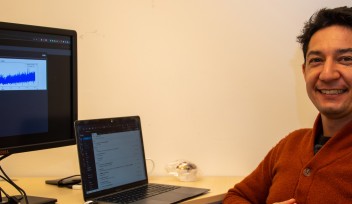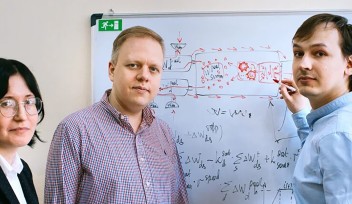Startups connect mind and body to impact disease treatment
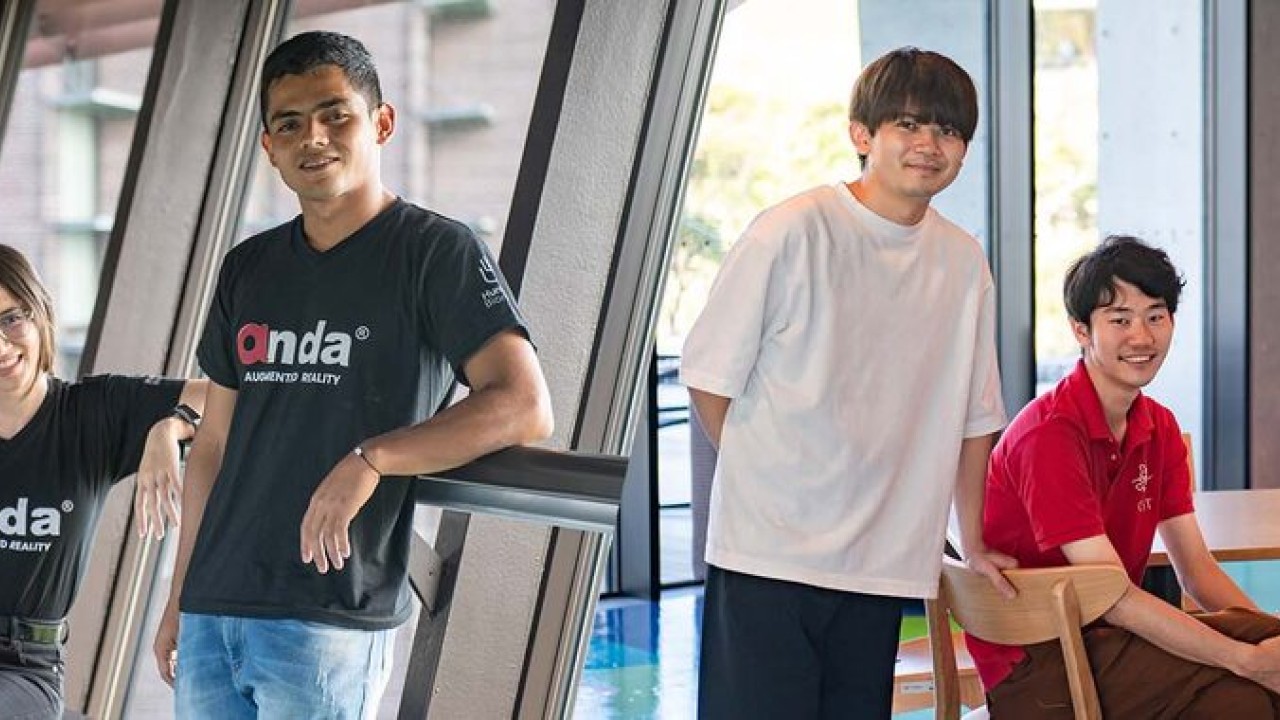
Researchers have long acknowledged the complex link between the mind and the body. Studies have attributed stress and anxiety to an increased risk of heart disease and a decreased immune response. It has also been shown that people with healthy, diverse microbes in the gut are less likely to suffer from anxiety and depression. Our thoughts and emotions can have profound physiological effects.
Two teams of entrepreneurs have recently joined the Okinawa Institute of Science and Technology (OIST) to tackle two distinct health problems, skin disease and Parkinson’s disease, by leveraging the connection between the mind and the body.
Hacking the senses with innovative tactile technology – Osaka Heat Cool
With the growing social value of the metaverse (virtual space), which was once reserved for game enthusiasts, new technologies that can reproduce sensory information are being developed every day to help combine our digital and physical lives. Following visual and auditory sensations, tactile sensations such as hitting, picking up, or pulling are now gaining attention as important elements for realistic reproductions of the virtual world. Osaka Heat Cool, a startup founded by researchers, including a faculty from Osaka University, is focusing on the tactile sensation of “temperature” and focusing this work, not on gaming, but rather to help people suffering from skin diseases.
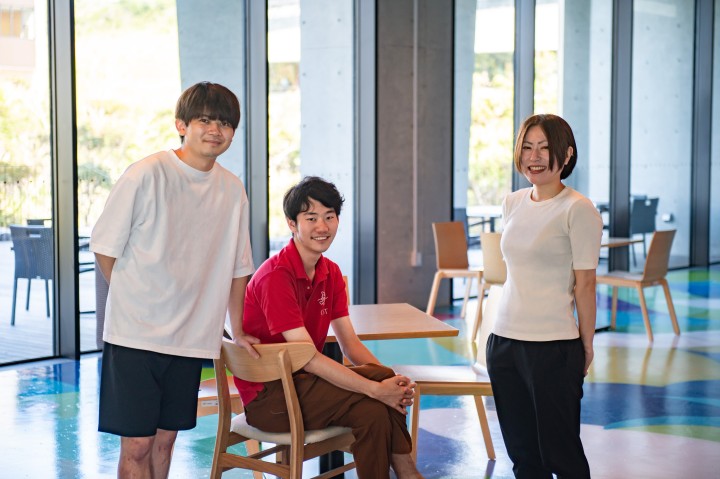
More than 100 years ago, Swedish physician Torsten Thunberg demonstrated that touching interlaced warm and cold bars to the skin elicited a burning sensation that was sometimes felt as pain but was actually harmless. This sensory illusion is called the "thermal grill illusion," and the phenomenon is being widely studied. Hoping to harness this illusion towards healthcare, the team at Osaka Heat Cool is developing a medical device with interlaced warm and cold components to alleviate the symptoms of skin diseases such as itchiness.
The thermal grill illusion varies from person to person, and the desired effect cannot be achieved if the design of the warm and cold bars is not optimized. So, Osaka Heat Cool team members, including Kiyono Yoshikuni, Yuki Aizawa, and Masato Matsudo, relocated to Okinawa to join OIST’s Startup Accelerator program to develop the device prototype, gain access the program’s business training and mentorship resources, and chart their global go-to-market strategy. Ultimately, the team aims to maximize the effectiveness of the medical device through clinical experiments and software development towards its commercialization.
Another thing the team is looking forward to during their time at OIST is practicing their English communications skills. One immediate goal is to have their prototype ready to exhibit at trade shows in the world.
"At OIST, there are scientists in various research fields from all over the world," said the team leader, Kiyono, with excitement for participating in the program. "We hope to expand our knowledge by deepening exchanges with them, and together we will create amazing things in Okinawa."
OIST operates the Startup Accelerator Program as part of its efforts to build an innovation ecosystem in Okinawa. Through this program, the university aims to support entrepreneurs who wish to launch technology startups in Okinawa. Each year, OIST carefully selects new participants of the program from entrepreneurs around the world. With the support of the Okinawa Prefectural Government, participants receive access to the university’s state-of-the-art lab facilities, business mentorship, and funding to establish their startups.
Colombian team aiming to help Parkinson's disease patients – anda
15,000 kilometers from Okinawa, a team of innovators from Bucaramanga, Colombia have been searching for ways to improve the quality of life of patients with Parkinson’s disease. Maria Valbuena and Carlos Rey are part of anda, a startup founded in 2016. Anda, which means “go forward” in Spanish, is developing technology to help Parkinson's patients who have difficulty walking without support.
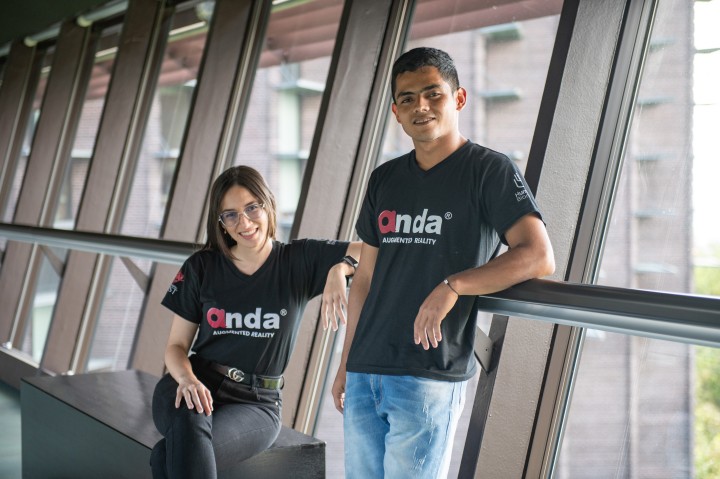
Parkinson's disease is a brain disorder that causes uncontrolled movements such as tremors, shaking, and difficulty in walking. More than 8 million people globally are living with Parkinson’s, a progressive disease with no cure. Research has shown that Parkinson’s patients have a decreased number of neurons that produce dopamine in the brain. While it is not known what causes the neurons to die, most people with Parkinson’s develop symptoms after the age of 60. So as the world’s population ages, the prevalence of Parkinson’s disease may increase.
While there is no cure, there are treatments that can relieve some symptoms such as medicines, surgery, and physical therapy but they each have limitations. For example, medicines that stimulate the production of dopamine and improve movement can come with serious side effects. anda is developing an alternative therapy to medicines by using auditory and visual cues controlled by a mobile app. Sounds with a specific frequency and rhythm have been shown to stimulate the production of dopamine and allow Parkinson’s patients to have more control of their gait.
By joining OIST’s Startup Accelerator Program, Maria and Carlos will work to integrate anda’s sound therapy with augmented reality (AR) glasses – wearable lenses that overlay virtual, visual information on the vision field – that will work with the app. The AR glasses will be equipped with cameras and sensors to analyze the surrounding environment and display directional cues to aid walking. In proof-of-concept experiments, visual cues have shown promise in improving the stride length of Parkinson's patients. As an added benefit, patients that are more confident in their walking and can be more active, which further promotes well-being.
Maria, who works in product and app design, shared her excitement for joining the program: "OIST's international network is very attractive for our startup’s global expansion plans. I would also like to improve my soft skills, such as English and business communications. I hope we can light the way for the future of the Parkinson’s patients around the world."
Osaka Heat Cool and anda are seeking business and investment partners to commercialize their technologies and bring relief to those in greatest need. Contact us for an introduction to the teams: innovation@oist.jp.
For press enquiries:
Press Inquiry Form










